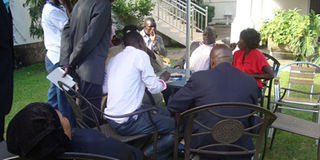Activists lose hope for 2016 electoral reforms

Some of the participants sign their allowances after the meeting in Masaka Town last Friday. PHOTO BY MARTINS E. SSEKWEYAMA.
What you need to know:
Not achievable. Participants argue electoral reforms can not be achieved given the remaining time to 2016.
Masaka: Time is running out for enactment of meaningful elections reforms ahead of the 2016 elections, Opposition groups have said.
This was during a two-day consultative meeting for Buganda sub-region in Masaka last Friday.
Civil society organisations including the Citizens Coalition for Electoral Democracy in Uganda [CCEDU] and the Opposition have since last year traversed the country arousing citizens’ civic duty to preserve democracy and constitutionalism.
CCEDU and the NGO Forum have variously collected proposals from citizens on amendments they want in the Constitution and electoral laws to ensure free and fair elections.
During the meeting, participants emphasised the need for an independent Electoral Commission, reinstallation of presidential term limits and a review of the voters’ register.
However, activists and Opposition members that Daily Monitor spoke to on Monday expressed pessimism, saying critical reforms would not be implemented, citing the time factor.
Mr Joseph Kasirye, a DP youth leader in Masaka, said although he submitted his views, he had less hope that they could be realised.
On his part, Mr Godfrey Kayemba, the Masaka Municipality Mayor, said much as several ideas were generated, “they appear to be a formality”.
Mr Joseph Ssenzoga, the FDC southern regional general secretary, doubted the independence of the NGO Forum which organised the meeting.
However, Dr Richard Ssewakiryanga, the executive director National NGO Forum, said they were playing their civic duty and would present the proposals in their original form.
No trust
Different view. Mr Bruce Tushabe, the chairperson of Volunteer Uganda, a political pressure group based in Lwengo District, says ideas generated in such consultations can’t be relied upon because most of the participants are motivated by allowances.




